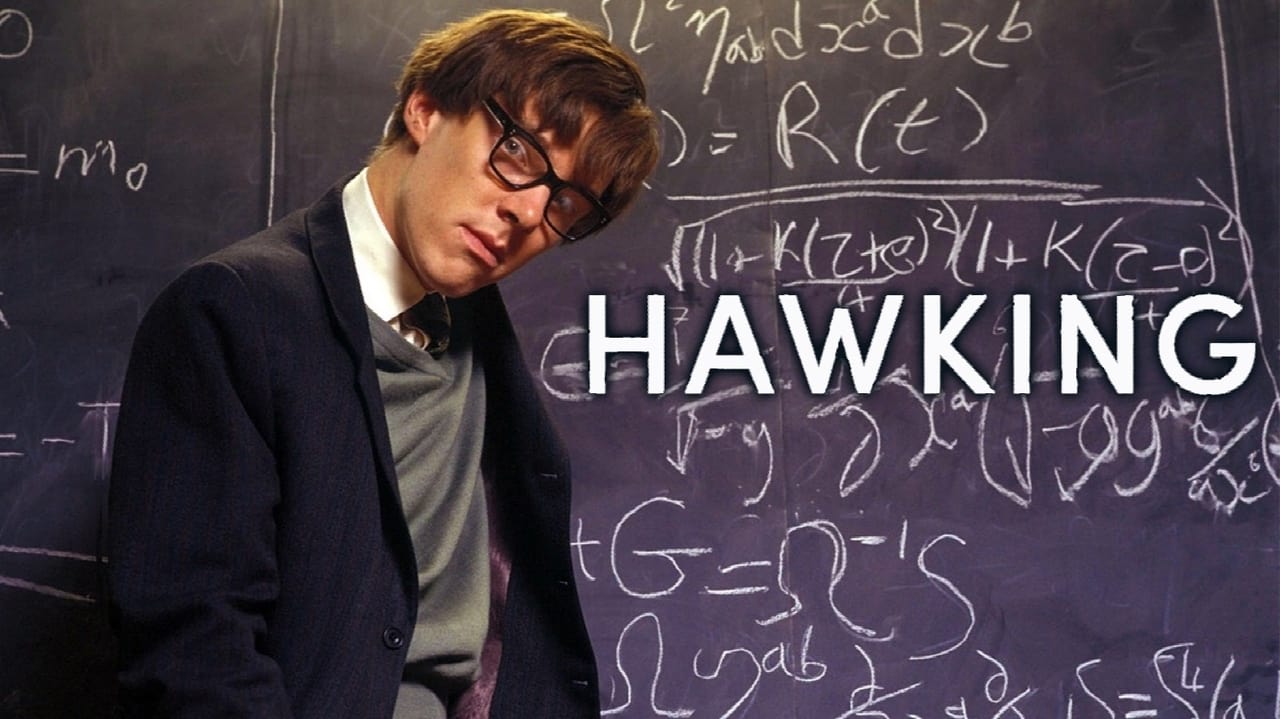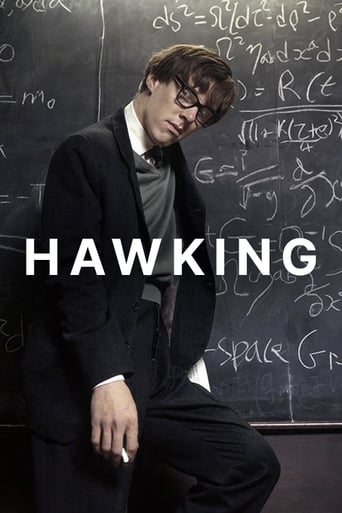Titreenp
SERIOUSLY. This is what the crap Hollywood still puts out?
Grimossfer
Clever and entertaining enough to recommend even to members of the 1%
Keeley Coleman
The thing I enjoyed most about the film is the fact that it doesn't shy away from being a super-sized-cliche;
Calum Hutton
It's a good bad... and worth a popcorn matinée. While it's easy to lament what could have been...
Judith McKenzie
The Theory of Everything is a fine film, as Hollywood films go, but this BBC Production "Hawking," made several years earlier, has me wondering why Hollywood bothered, as none could match the performances in nor the spirit of this film. A lovely portrayal (as usual) by Cumberbatch as Hawking, and Firth makes the perfect (sympathetic and pitiable) antagonist. This film, in contrast to the recent Hollywood knock-off, focuses on the brilliance and courage of an amazing man with an amazing mind. The film begins in the 1960s, prior to the onset of Hawking's motor neuron disease, and focuses on his struggle to maintain his work while fighting the progression of motor dysfunction. As a (retired) member of the academy, I can attest to the realism of the struggles he faces in gaining support for his work, and the energy required to do so, brilliantly portrayed in this film. I was privileged to see Professor Hawking speak once in Seattle, and one knew that one was in the presence of a once-in-a-generation mind. This film, and Cumberbatch's performance, authentically conveys that sense. Highly recommended.
dy158
It is 1978, and two men are waiting to collect their Noble Prize in Physics in Sweden. Arno Penzias (Michael Brandon) and Robert Wilson (Tom Hodgkins) were preparing to give a television interview before they are due to collect their prize. The interview with the journalist (Christian Rubeck) would be about how a hissing sound they discovered inside a huge satellite receiver won them the Nobel Prize.It would intercut with a seemingly unrelated event from 15 years before in 1963 in England where Stephen Hawking (Benedict Cumberbatch) was celebrating his 21st birthday. He was actually watching Fred Hoyle (Peter Firth) talking about his steady state theory on television, before he went into another room where his birthday party was held in his house after the programme ended. He was delighted to see the girl he had met from another party Jane Wilde (Lisa Dillon) in the room. They would later go out to the back garden and discuss about the sky while lying down. But when Stephen tried to get up later on, he could not do so. Jane had initially thought Stephen was joking with her before she became worried and went to get help.Stephen would come to find himself being put through a series of tests at the hospital's operating theatre. The following day, as the nurse was moving his pillow causing him to lean forward, Stephen noticed a young boy across him where he would learn the boy was 12 years of age and had leukemia. When Stephen woke up the next day, the boy was no longer there as he learned that the boy had died the night before. Stephen would run into his doctor who tells him he has Motor Neuron Disease, which would cause anxiety all around and even in the family for his parents Frank (Adam Godley) and Isobel (Phoebe Nicholls).Later in the same year, Stephen would be studying at Trinity Hall at Cambridge where he would begin his first year as a doctoral student where he would be tutored under Dennis Sciama (John Sessions). It was also when he would come to publicly challenge Hoyle on his steady state theory with his student Jayant Narlikar (Rohan Siva) which would lead to what he come to produce in his dissertation as partly inspired by what another professor Roger Penrose (Tom Ward) had taught.Those who has a deep interest in science will take an interest in this, especially for what the real Stephen Hawking would come to be known. The average audience will not be able to understand much of the concepts as explained in the television movie as it will look abstract to the. Thus for the average audience, they may not be able to understand why there are times the scenes of showing Hawking during his Cambridge days intercuts with the television interview Arno Penzias and Robert Wilson was doing, even if it would be explained towards the ending on the screen on what the two men in real life would receive the Nobel Prize in Physics for.But for everyone else, it is a reminder of the real Stephen Hawking's early path to his scientific greatness as he would come to challenge Fred Hoyle on what he had proposed, or as Hawking said in the television movie, "We are very very small. But we are profoundly capable of very very big things."
silverfrog10
I didn't expect to enjoy this film. I did, and I'm still thinking about it. It was moving, emotional, sensitive and brilliantly crafted.I know little about Stephen Hawking, and the subjects of physics and cosmology are completely over my head. I think it is a testament to the script and performances that this film made such subject matter appealing and engaging. Don't think the film is for science geeks - it is an uplifting story full of courage and hope and is thoroughly rewarding. Benedict Cumberbatch is quite simply brilliant in this film. He is without doubt one of the finest actors in Britain.
Kasterborous
The story of young Stephen Hawking's doctorate - starting with his 21st birthday in 1963, shortly after which he was diagnosed with motor neuron disease. The story continues with Hawking going to Cambridge to gain his doctorate, during which he fights to come to terms with his illness, grows ever-closer to young student Jane Wilde, and has to figure out something to write his thesis on... ...All this is told in flashback by Nobel Prize winners Bob Wilson and Arno Penzias (Tom Hodgkins and the marvellously irascible Michael Brandon, respectively), talking in 1978 about their discovery - the "3 degree hiss" of microwaves that is the echo of the Big Bang, which is the proof of Hawking's remarkable and evolutionary theory that he formulated for his doctorate thesis. Hawking didn't come up with the idea of the Big Bang, but he did show mathematically that the prevalent theory of the time - "Steady State", in which the universe was thought to be unchanging and to have existed forever - was wrong.The performances are uniformly excellent, with Benedict Cumberbatch in the lead role making for a very convincing Hawking, capturing his brilliance and vulnerability well and portraying his physical deterioration sympathetically and convincingly. Other standout performances include Tom Ward as Roger Penrose, giving a superbly confident and energetic portrayal of the young professor who was Hawking's friend and mentor; John Sessions as Dennis Sciama, quiet and intense as Hawking's supervisor; Peter Firth as a triumphantly and permanently bad-tempered Fred Hoyle, with whom Hawking locked horns over their contradictory theories on the origin of the universe; and Lisa Dillon as Jane Wilde, who gave Hawking the strength to overcome his illness and realise his ideas.Is this a sanitised or oversimplified story? Undoubtedly, but these things always are. That doesn't matter; the main characters are engaging, and the science is extremely well-handled. Hawking's "eureka" moment, when he literally falls off a train and desperately explains his idea to Penrose by drawing with chalk on the station platform, is powerful and moving and believable in equal measure. This drama shows that it's not just the great artists, the painters and composers and musicians, who have led remarkable and fascinating lives - science, in its own way, has just as much power to move and intrigue, and scientists have just as many great stories to tell.

